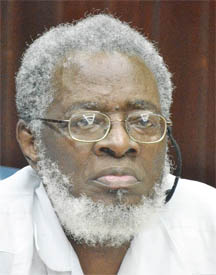Head of the Presidential Secretariat Dr. Roger Luncheon yesterday denied that the National Insurance Scheme (NIS) is in immediate financial trouble and could soon collapse, in the face of warnings that it is nearing a crisis stage unless reforms are urgently implemented.
“Dire reflects some immediacy like yesterday… Is this NIS a sinking ship that is ready to go down? Non-sense… As we sit here today, the scheme is healthy… I intend to draw pension for a good lil while… We are willing to concede that uncertainty prevails and unless we agree and we implement those reforms, then we will start talking about dire times,” Luncheon, who also chairs the NIS Board, said at his post-Cabinet press briefing yesterday.
He was asked whether the NIS was in a dire position, in light of the findings of the draft eighth actuarial review of the NIS, which is urging the raising of the contribution rate from 13% to 15% no later than January next year, hiking the wage ceiling to $200,000 per month and a phased raising of the pension age from 60 to 65 in order to keep the scheme afloat.

Dated October 18, 2012, the report noted that no remedial action had been taken since 2008, when the 7th actuarial review had proposed a number of reforms. In addition, a NIS reform committee appointed by the government had made reform recommendations in 2007 but there was no meaningful change. More recently, NIS’s finances have further been clouded by the impairing of its $5.8B investment in CLICO (Guyana).
Luncheon, who has chaired the NIS Board since 1992 and has faced criticism during his tenure, yesterday agreed that there was much evidence not only from seventh report but also from the NIS reform committee of problems in the scheme. But he noted that the recommendations were not mandatory and choices could be made on implementation, although he admitted that the latest review suggests that “specific recommendations… should have been given greater attention.”
“The board was rather selective with regards to the recommendations that it endorsed and implemented… One concedes that a recommendation is not an instruction and it is the board’s judgment if a recommendation or a series of recommendations would be eliminated. We made the decision to eliminate some and the decision not to eliminate some,” he said.
Meanwhile, Luncheon added that along with the reform measures, government is also exploring a new intervention, such as putting to parliament sustainable measures, to keep the NIS from failing.
Done by Actuarial and Financial Consultants, Hori-zonow, the Executive Summary of the actuarial report noted that in 2011 the NIS experienced the first ever deficit in its 42-year history of $371M. A larger deficit is envisaged this year and the report said that with assets of just over two times its annual expenditure the “entire Fund will be exhausted in less than 10 years if (the) contribution rate increases and benefit reforms are not made immediately.”
It added that the changes required to place the NIS on a stronger footing are extensive. “Tough decisions will be required. There is very little room to meet the many requests for additional benefits. To ensure that required reforms are implemented soon the support of all aspects of society will be required. The NIS should therefore engage all stakeholders and the public at large very early in reform discussions,” the review said.
n what would be seen as a criticism of the scheme’s governance, the review said that “Good Governance practices are essential for the success of any organization” and it commended the International Social Security Association’s good governance guidelines to the NIS. “It is strongly recommended that the NIS review and use these tools prepared specifically for social security schemes to help guide its transformation into an efficient and sustainable system that will be able to deliver on its promises for decades to come,” it noted.



